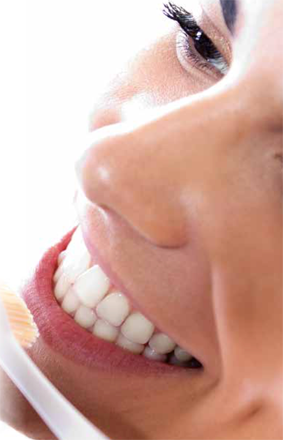Dr Reham Ma’ani,
Dental & Oral Surgeon
Women are more susceptible to changing hormone levels at puberty and from certain types of birth control, pregnancy and menopause.
These hormonal changes can impact oral health. It is important to learn more about the connection between hormones and women’s oral health.
Puberty Estrogen and progesterone are hormones in the body and are major players in the process of puberty, triggering reactions in the gums that can lead to redness, bleeding and swelling of the mouth.
Gums may react differently to germs and bacteria in the mouth of adolescent girls and, as a result, can cause cavities and bad breath, along with gingivitis (gum inflammation characterised by redness, swelling, tenderness and bleeding).
Canker sores and swollen salivary glands are also symptoms a woman may experience during her menstrual cycle.
Maintaining good oral health habits and regularly visiting the dentist for cleanings and checkups are key components of healthy gums and teeth in adolescent girls.
Women who use birth control pills, or oral contraceptives, should notify their dentist. Maintaining good oral health while taking this medication is crucial.
Hormone levels in women using birth control pills, especially those containing progesterone, can increase blood flow to the gums. This heightens a woman’s risk of developing gum disease. In this case, a dentist may prescribe antibiotics to help treat gum disease.
At first glance, it may not seem like oral health has much to do with pregnancy, but maintaining good oral health is critical. A mother’s oral health can affect the overall health of her baby, so it’s important to pay close attention to dental care and any changes that may arise while pregnant.
An abundance of estrogen and progesterone are the culprits behind many dental-related changes during pregnancy.
Because of this increase in hormones, it’s common for pregnant women to develop “pregnancy gingivitis”; an inflammation of the gums and surrounding tissue characterised by redness, swelling, tenderness and bleeding.
Gingivitis can lead to a more severe form of gum disease, which increases the risk of pregnant women having pre-term or low birth-weight babies.
Professional cleanings help keep conditions, like gingivitis or gum disease, in check.
Also, to maintain good oral health habits such as brushing twice daily with fluoride toothpaste and flossing daily, paying special attention to the gum line.
It is recommended to schedule a regular dental cleaning and exam early in pregnancy to determine if any conditions exist that may require treatment.
The safest time for pregnant women to have X-rays or other dental procedures is during the second trimester.
Visiting the dentist regularly can help lower the risk of serious, ongoing health issues for a pregnant woman and her baby.
Menopause
It’s important for women experiencing menopause to pay special attention to their oral health. Postmenopausal women often experience dry mouth due to a decrease in saliva production. Saliva helps defend against periodontal (gum) disease and tooth decay as it washes food off teeth, neutralises acids in the mouth, fights germs and prevents bad breath.
Certain medications can increase the risk of dry mouth and menopausal women should alert their dentist if they experience symptoms of dry mouth.
The hormonal changes that occur during menopause can also increase a woman’s risk of osteoporosis, which causes bone loss in the body. Bone loss in the jaw increases the risk of tooth loss. Women can prevent the oral health effects of osteoporosis by following nutritious eating habits that include plenty of calcium and vitamin D and discussing proper treatment options with a doctor and dentist.
Hormones are part of life, but they don’t have to interfere with a woman’s ability to maintain a healthy smile at every age and stage of her life.
Women can maintain their oral health through good oral health habits like brushing, flossing, regularly visiting the dentist and following a healthy diet.
Taking steps to improve oral health, or encouraging an important woman in your life to improve her oral health, starts now!
Reprinted with permission from Family Flavours magazine
